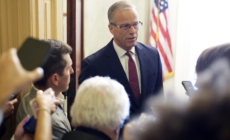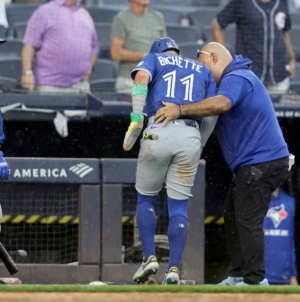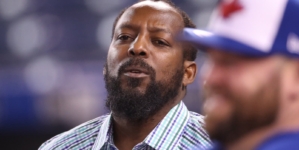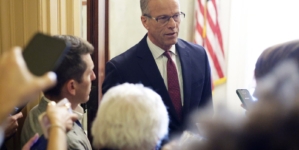-
Blue Jays’ Bo Bichette Has 2-Word Response About World Series Availability - 11 mins ago
-
G.O.P. Senators Oppose Trump Watchdog Nominee After Report of Racist Texts - 43 mins ago
-
Vladimir Guerrero Sr. Has Message for Son After Blue Jays Win ALCS - 47 mins ago
-
The Republicans Who Denounce Trump Nominee Ingrassia After Leaked Texts - about 1 hour ago
-
China Has Another Lever to Pull in Showdown With Trump: Factory Lines - about 1 hour ago
-
Controversial Texans Star Likely Facing NFL Punishment for Actions vs Seahawks - 2 hours ago
-
Daniel Naroditsky, Chess Grandmaster, Dies at 29 - 2 hours ago
-
WWE Raw Determines New Championship Contender With Huge Battle Royal - 3 hours ago
-
With SpaceX Behind Schedule, NASA Will Seek More Moon Lander Ideas - 3 hours ago
-
Packers HC Makes Feelings Clear on Facing Aaron Rodgers - 3 hours ago
Catholic Church Scores Legal Win Over Attempted Change to Confessions
A federal judge has permanently barred Washington state from enforcing a 2025 law that would have required Catholic priests to report child abuse learned in the confessional, ruling that the measure violated constitutional protections for religious exercise.
Newsweek contacted the office of the Attorney General for Washington state via email outside of normal office hours on Wednesday for comment.
Why It Matters
The ruling matters because it marks a decisive boundary between state authority and religious freedom, affirming that Washington cannot compel clergy to violate the confidentiality of confession even in pursuit of child-protection goals.
By permanently blocking the state’s attempt to eliminate the clergy-penitent privilege, the court reaffirmed that mandatory-reporting laws must operate within constitutional limits.
The decision preserves priests’ religious autonomy, while leaving intact other reporting duties—and it signals to lawmakers nationwide that efforts to expand abuse-reporting mandates cannot override core First Amendment protections.

What To Know
Court Issues Permanent Injunction
In an order entered October 10, 2025, U.S. District Judge David G. Estudillo approved a stipulated permanent injunction in Etienne vs. Ferguson and a companion case brought by the Orthodox Church in America.
The order prohibits the state and county prosecutors from enforcing Senate Bill 5375 “as to the Sacrament of Confession against the Plaintiffs…and all Roman Catholic priests in Washington.”
Both the Attorney General’s Office and the county prosecutors agreed to the injunction and to waive any appeal.
The Law at the Center of the Dispute
SB 5375, signed into law by Governor Bob Ferguson on May 2, 2025, added clergy to Washington’s list of mandatory reporters of child abuse and neglect.
The statute, effective July 27, 2025, removed the clergy-penitent privilege that had previously exempted confessional communications under Revised Code of Washington § 26.44.030.
Violations would have carried criminal penalties of up to 364 days in jail and a $5,000 fine.
Three Catholic bishops—Archbishop Paul D. Etienne of Seattle, Bishop Joseph J. Tyson of Yakima, and Bishop Thomas A. Daly of Spokane—filed suit in May, arguing that the law forced priests “to violate their sacred vows or face punishment by the state.”
The United States Department of Justice intervened in support of the bishops.
Separate Orthodox plaintiffs filed a nearly identical complaint in June.
Judge’s Ruling
In July, Estudillo granted a preliminary injunction, finding the plaintiffs were likely to succeed on their First Amendment Free Exercise Clause claim.
He wrote that the state’s elimination of the confessional privilege “burdens sincere religious practice” and “is neither neutral nor generally applicable” because other professional privileges, such as attorney-client communications, remained intact.
Friday’s permanent injunction converts that earlier ruling into a final judgment. “This order enjoins the state defendants from enforcing SB 5375 as to the Sacrament of Confession,” the court stated, concluding the litigation by agreement of all parties.
Attorney General Nick Brown said in a statement that the settlement “keeps crucial portions of Washington’s mandatory reporting law in place, while also preserving the legislature’s authority to address issues with the law identified by the court.”
He added that the decision “does not prevent lawmakers from revisiting the matter in the future,” according to the Washington State Standard.
Reaction From Both Sides
Catholic officials welcomed the outcome.
“Preventing abuse and upholding the sacred seal of confession are not mutually exclusive—we can and must do both,” said Jean Hill, executive director of the Washington State Catholic Conference. “That’s why the Church supported the law’s goal from the beginning and only asked for a narrow exemption to protect the sacrament.”
Mark Rienzi, president of Becket, which represented the bishops, called the resolution “a victory for religious freedom and for common sense. Priests should never be forced to make the impossible choice of betraying their sacred vows or going to jail.”
Supporters of the original legislation voiced frustration.
Mary Dispenza of the Catholic Accountability Project said, “Priests are not above the law. This secrecy or ‘priest privilege’ fails children and keeps perpetrators safe—able to molest and assault children again and again.”
State Senator Noel Frame, a Democrat, the bill’s sponsor, said her intent “all along…has just been to protect children.” She added, “Children need to know that when they go to a trusted adult…they get help. That’s how we break the cycle of abuse and do better by our next generation.”
The stipulated injunction ends the lawsuits, but not the broader policy debate.
Because Estudillo’s order rests on federal constitutional grounds, the legislature could propose a new version of the statute consistent with the ruling.
For now, Washington’s clergy-penitent privilege remains intact, and priests cannot be compelled to disclose information learned in confession.
What People Are Saying
Mark Rienzi, president and CEO of Becket Religious Liberty for All in a press release, June 6, 2025, said: “Washington state has no business intruding into the confessional—particularly when they give a free pass to lawyers who have legally protected confidential relationships with clients,” and added: “Punishing priests for following the Catholic Church’s millennia-old faith traditions isn’t just wrong, it’s unconstitutional.”
What Happens Next
With the permanent injunction now in place and no appeal planned, Washington’s effort to compel clergy to report child abuse disclosed in confession has ended—for now.
Priests remain exempt from reporting what they hear in the confessional, though they must still alert authorities if they learn of abuse outside it.
The ruling leaves the legislature free to revisit the issue, but any new bill would have to comply with constitutional protections for religious freedom.
For advocates on both sides, the decision closes one legal battle, while setting a precedent that will shape future debates nationwide over how far child-protection laws can reach into matters of faith.
Source link




















